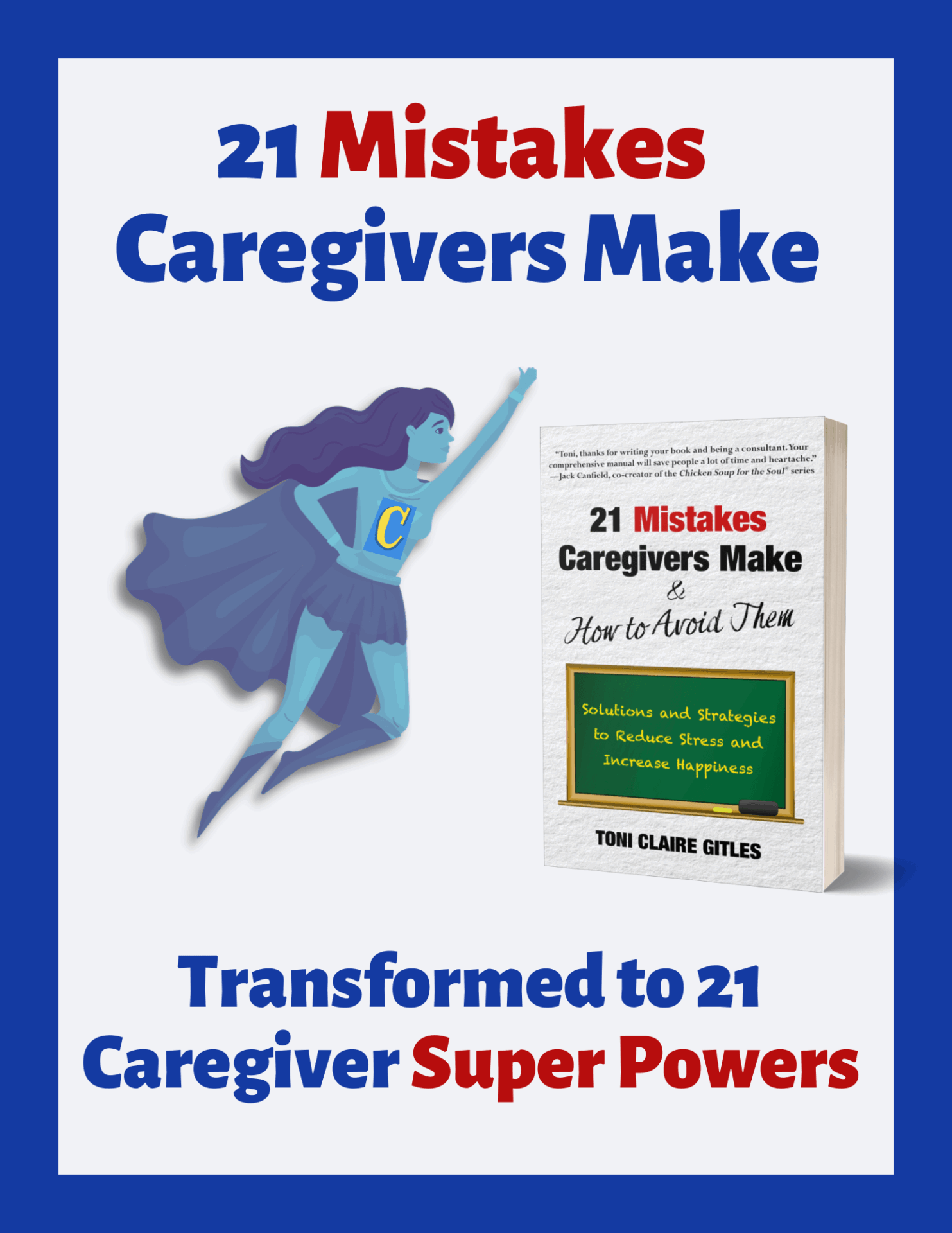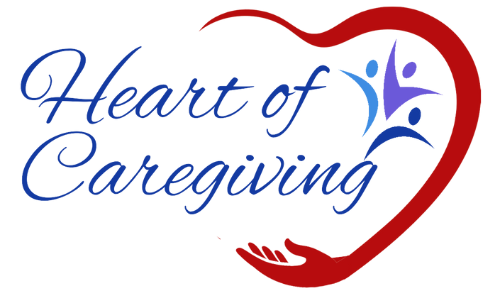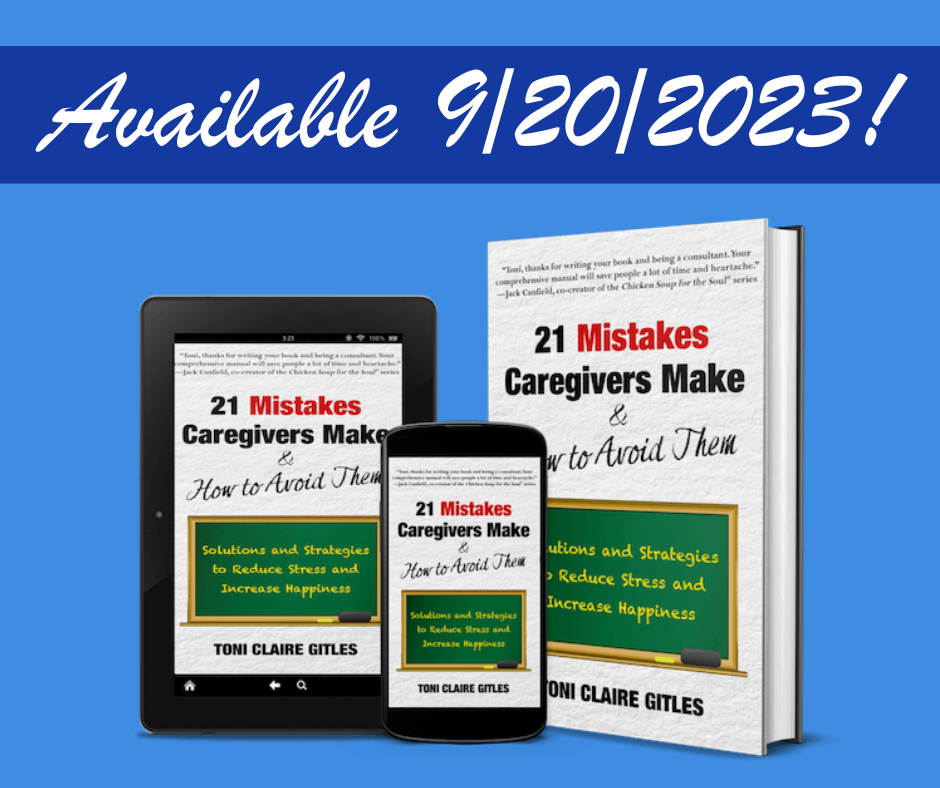I am excited to share 21 Mistakes Caregivers Make & How to Avoid Them with family caregivers. I want to give you a sneak peek into how this will be a guidebook to accompany caregivers on their journey. 21 Mistakes Caregivers Make & How to Avoid Them provides an understanding of the caregiving experience and responsibilities, how to approach the challenges, prepare for the stressors, and have a more joyful journey. This book is organized into seven parts and guides the caregiver in identifying responsibilities, managing communication, and asking for support.
Part I You are Unprepared for a Health Crisis
You don’t relate to the title “Caregiver,” you don’t organize the health history of your loved one (or yourself), and you take your responsibilities for granted. A crisis, by definition, is sudden and unexpected. We can be blindsided by a diagnosis or a hospitalization that immediately becomes a medical crisis. During an emergency, our caregiver responsibilities intensify, and expectations of us increase. The stress we experience is compounded by our lack of confidence and fear of making a mistake or the wrong decision. The learning curve during a crisis is steep, and when we are ill-prepared, we can’t get traction because we are simply trying to hold on. There is hope! We can anticipate and prepare for some of the unexpected events that commonly occur when caring for an aging family member. We can take steps to prepare for a medical crisis so that we can spend our time as a confident advocate and support to our family member.
Part II Everything Changes, and You Fail to Change
You may notice warning signs but ignore them. There may be denial thinking, for example: “This can’t be happening,” and deciding that taking action to help your loved one can wait. Caregiving changes our life’s trajectory and doesn’t get the attention a birth, death, marriage, home purchase, or disease diagnosis receives. We don’t send out announcements, host a get-together, receive words of support, or often even share that we have embarked on a caregiving journey. Understandably, we stay in denial. We can be more in tune with what the future holds when we step out of denial and into awareness. A heightened sense of awareness is not the same as a heightened sense of worry. We can watch for the warning signs and a change in the baseline. We can face our fear and lean into the learning curve.
Part III You Don’t Know What You Don’t Know
The caregiver role is new, and you fail to shift your mindset about the circumstances and your role. Therefore, you are unaware of your new responsibilities and don’t speak up to authority. When you start a new job, you learn your title, receive a job description, a list of responsibilities is offered and explained, and you are trained in your new role. When we become a caregiver, we may not recognize that our role has a title and a defined responsibilities list that will continue to grow. We learn on the job without a supervisor, trainer, or colleague guiding us. We can emerge from the overwhelm and take back control by shifting our mindset from helper to CEO and creating roles and responsibilities lists. When we assign ourselves the role of Caregiver CEO and advocate, we can choose which tasks we will keep and which we will delegate and manage, freeing up more time to focus on well-being.
Part IV You Don’t Prioritize Your Well-being
You don’t take care of yourself first, ask for help, or look for and find resources to support you and your loved one. When we begin helping a family member, our efforts may only require a few hours a week. We can balance competing priorities reasonably easily. As we identify more and more areas to provide help, we begin to prioritize care responsibilities over our hobbies and interests. Resentment starts to build. How can we possibly prioritize our well-being when our family member’s needs are so intense? We can reclaim time, regain energy, and reset our priorities so that well-being rises to the top of the list when we locate help and resources so that we can continue to participate in the activities that give our life meaning.
Part V Ineffective Communication Skills
You fail to find out what your loved one needs and wants and how family and friends can help, and you settle for an incomplete understanding of doctor’s orders and explanations. When we become a caregiver, we are in a new role, and our prior communication styles may not fit the new situation. We may need to learn new interpersonal skills and ways of communicating with friends, family members, and our loved one for whom we care. Communication with doctors and healthcare professionals takes a new level of preparation and finesse. You can employ communication strategies to help you rise to the new expectations of your role and be an effective communicator with your loved one and care team members. You can lead with curiosity, make direct requests and adjust expectations to minimize disappointment and resentment. You can find your voice and learn how to confidently advocate for your family member.
Part VI Not Planning for an Uncertain Future
You don’t have legal documents in order, and you are unaware of financial information for yourself or your loved one. Denial can feel like a safe space, but it is the most dangerous path we choose when a care opportunity looms on the horizon. Prepare and be empowered to help your loved one navigate the future. Start the conversation to understand your family member’s current medical, financial, and legal situation and their wishes for the future. You can consult with professionals to understand the options, make better choices, minimize conflict, and be empowered to care and advocate for your loved one.
Part VII Dismissing Happiness and Celebrating Life
You put your permission to enjoy living on hold and cease or question your connection and guidance with a higher power. Unknowingly, you undervalue giving and receiving love in your relationships. Caregiving and happiness can seem mutually exclusive when struggles and worry are all-consuming. Caregiving is complex, with seemingly impossible challenges. Our negative thoughts and beliefs add to the suffering and pain, creating stress, worry, guilt, and arguments with family and friends. There is an alternative. You can find happiness while you face struggles. While some of us may be more predisposed to happiness, with intention and strategy, we can each be happy even during some of the most challenging circumstances. Remembering our Why, our source of strength, our raison d’être is vital. We can look for new ways to receive and give love and celebrate life and our loved one each day.
By completing the action plan exercises at the end of each chapter, you will create a dynamic caregiving plan you can implement, which will relieve stress, and some uncertainty. Put yourself in control of the things you actually can control. In caregiving, as in life, things don’t always go as planned. Your reaction and attitude influence your experience.
21 Mistakes Caregivers Make & How to Avoid Them is available September 20, 2023! Sign up for release information, receive the book overview and 21 Caregiver Superpowers, and stay connected to The Heart of Caregiving community!




Love this!! Thanks..Let’s chat, if you have time.
I have been looking for something like this… Much better than I could have done.
KUDOS!!